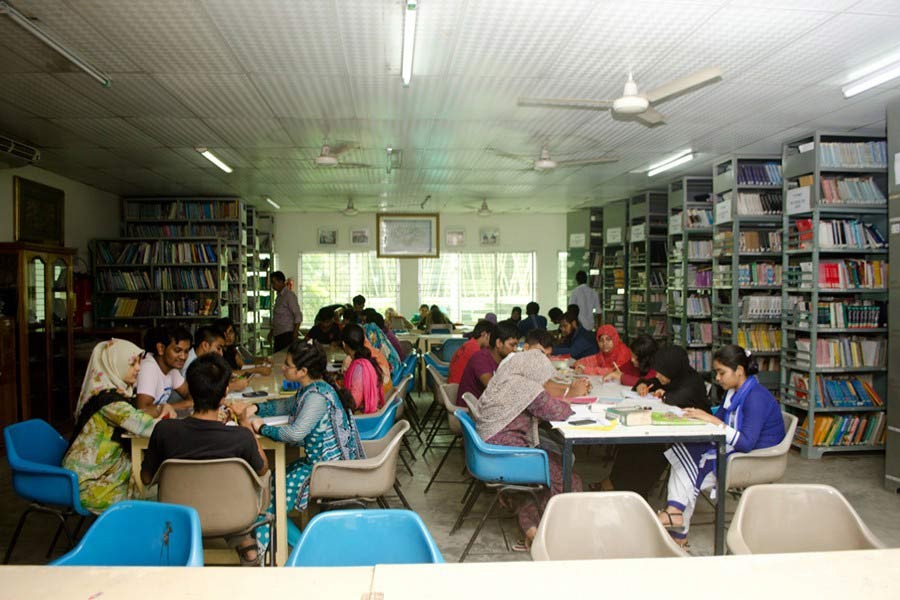The nation will celebrate the National Library Day 2021 on Friday (February 5, 2021). The theme of the day is 'library in ever house is the pledge of the Mujib Year'. In collaboration with the Department of Public Libraries (DPL) and Ministry of Cultural Affairs, all library professionals in Bangladesh have been celebrating the day since 2019.
The idea of observing the National Library Day has come into light after two years of non-stop advocacy from the country's library professionals. The Department of Public Libraries has worked as a focal body in this regard. Besides, the British Council, UNESCO, BRAC, LAB along with other eminent library professionals were involved with this initiative. They forwarded a proposal to the Prime Minister's Office justifying the importance of the Library Day to build a knowledge-based society throughout the country.
Considering the importance, Prime Minister Sheikh Hasina has approved it and declared that each year February 5 will be observed as the National Library Day in the country. It is to be noted that the foundation stone of the Central Public Library was laid on February 5, 1954 in Dhaka.
This year's celebration is different from other years for two reasons. One is Mujib Barsha (Year of Mujib) and the other one is coronavirus. The whole nation is observing a year-long celebration marking the 100th birthday of the Father of the Nation Bangabandhu Sheikh Mujibur Rahman. His birth centenary is also being celebrated all over the world in line with the initiative of UNESCO. On the other side, we are facing a difficult time due to the Covid-19 pandemic. Celebrating the National Library Day in such a situation gives us the right message that every house should have a library.
Bangabandhu was not only the founder of Bangladesh, but also a visionary leader who wanted to make Bangladesh free from hunger, poverty and illiteracy. So he gave his highest priority on education.
After 1970's general election, Bangabandhu's nation-wide radio and TV address reveals the thought on it, as he mentioned, "No investment is as vital for the healthy development of the society as in education.... Primary education is denied to more than half of the children. Only 18 per cent of our boys and six per cent of our girls complete first five years of elementary school. We believe that at least four per cent of the Gross National Product should be kept for education. The salary of the college and school teachers must be substantially increased. Illiteracy must be eradicated. A crush programme must be launched to extend free and compulsory education to all children within five years. Secondary education should be made readily accessible to all sections of people. New universities including medical and technical universities must be rapidly established. Poverty should not be allowed to deprive meritorious boys and girls of the opportunity to pursue higher education".
Development without education bears no fruit; similarly education without knowledge has no root. There is no doubt about the fact that development is a product of education and library is the heart of the educational institutions from where people acquire knowledge. Library is the vast accumulation of knowledge which acts as a living apparatus. It preserves all the information of the past for use of the present generation and it creates a link between the past and present generation for the utilisation of information to the future generation. So, the role of libraries in the context of development and education is clear.
The importance of library is also underscored by present Prime Minister Sheikh Hasina on several occasions. For instance, she was presented as chief guest at the Bangladesh Library Association Conference in 2012 where she pointed out that library is the part and parcel of our everyday life. She also instructed that no educational institutions would get the government affiliation if it does not have a quality library with a professional librarian. Just after her declaration, Ministry of Education (MoE) has circulated a government order to create 28,500 vacant posts for school, college and madrasa libraries throughout the country. They have fixed specific criteria that every candidate must have either honours/masters or post-graduate diploma degree in Library and Information Science from any recognised university or other educational institutions affiliated by the National University. It has brought radical changes in the current job market and the demand of the library profession got momentum. But, as of today there are only three public and two private universities that offer bachelor and masters degree in library and information science. Around 200 students are coming out each year with these degrees. Due to not having proper counseling, most of the students enrol there 'by chance' not 'by choice'.
Due to shortage in professional degree-holders, many library professional positions are being occupied by the unqualified people. Some dishonest people have established fake educational institutions for selling certificates. The less-qualified or even the people who are totally unaware about this discipline are entering this profession. If these things continue, the profession will fall in trouble in near future. The government and allied bodies need to take care about it.
No doubt, this discipline is quite different from the others. In terms of its service pattern, it is the fact that library and information science is a technical subject which needs professional knowledge with practical education. Without having particular course curriculum and suitable logistics, achieving proper degree is impossible.
Policymakers should come forward to monitor the issue strictly and LAB and other library professionals should enlighten how libraries of the future can be designed to deal with the problems of today.
Dr Md Nasiruddin Mitul is Professor and Dean, Dept of Library and Information Science, National University, Bangladesh


